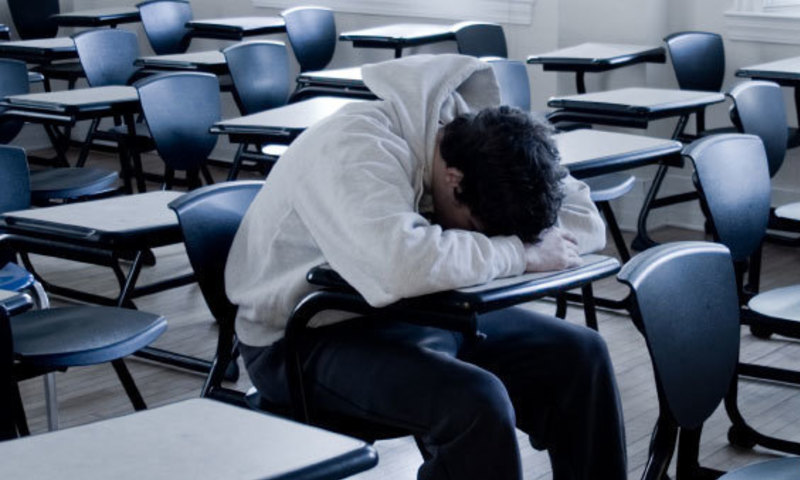Fell asleep in class again today?
But still lying awake at 2 am?
Slept through your alarm (and Chapel)?
College students are among the most sleep-deprived people in the country. According to a 2001 study, only 11% of college students have good sleep quality, and 73% have occasional sleep problems. That same study found that 18% of college men and 30% of college women reported suffering from insomnia within the past 3 months, and over half reported feeling sleepy during the morning.
Most people need to sleep about 8 hours each night. This is especially true for college students, since the deep sleep that occurs early in the night and the dream sleep that occurs later in the night are both required to learn.
USNews writer Kelci Lynn Lucier says
"There's a reason most college students sleep in whenever they have the chance: they're exhausted, sleep deprived, and in desperate need of some zzzz's at any given time. And yet finding time to sleep in college can be quite challenging, given that sleep often is the first thing to get cut when stress levels and workloads pile up. "
What happens if I don't get enough sleep?
Sleep deficit results from not getting enough sleep for several nights. Building up your sleep deficit results in a decrease in daytime function. It can affect your physical health by weakening your immune system. It can affect your mental health by resulting in tension, irritability, depression, confusion, and generally lower life satisfaction.
It's well documented that sleep-deprived students perform significantly worse than students who regularly get a good night's sleep. REM sleep is particularly important for consolidating newly learned information, and a large proportion of REM sleep occurs towards the end of the night. So studying most of the night for a test, and then sleeping only a few hours, decreases your ability to remember new information.
Not getting enough sleep also seriously impairs your ability to drive. Driving while tired is as dangerous as driving while intoxicated - more than 40,000 injuries and 1,500 deaths each year result from traffic accidents involving sleepy drivers.
How can I get a better night's sleep?
• Relax! An alert mind may make it difficult to sleep. Try to slow the pace of your activities in the evening, and develop a bedtime wind-down routine that you follow faithfully. Do some light reading or watch TV until you become drowsy, and then try to fall asleep naturally.
• If there's a lot on your mind, try writing down a detailed list and then forgetting about it. Try this visualization technique: pretend that your mind is a chalk board. Every time a worrisome thought enters your head, visualize it as written on the chalk board and then immediately erase it. Keep erasing these thoughts as they pop up and refuse to think about them until tomorrow.
• Avoid or limit caffeine, not only in soda but in things like chocolate (sob!).
• Exercise and stay active. Twenty to 30 minutes of vigorous physical activity enhances deep sleep, but avoid exercising in the 4-6 hours before bedtime since it increases alertness.
• Avoid long naps. Naps of less than 30 minutes can actually be quite refreshing during the naturally occurring mid-afternoon slump, but napping for much longer than this can make you drowsy and interfere with a good night's sleep.
• Take a look at your diet. Make sure that you are consuming adequate amounts of B-complex vitamins, as several of the B vitamins can enhance restful sleep as well as reduce fatigue. If you are not eating a well-balanced diet, consider taking a supplement.
• Set realistic daily goals. Setting goals helps to minimize the possibility that you will stay awake thinking about what you have not accomplished that day. Perfectionists and worriers tend to have more trouble sleeping.
• Establish a regular sleep schedule. Although this can be difficult for college students, as much as possible, it is important to try to go to bed and wake up at approximately the same time each day, even on weekends when you're trying to 'make up' sleep. Otherwise it's like putting yourself through jet lag over and over again!
• Practice diaphragmatic (deep) breathing. When practiced before bed, not only will deep breathing help you to feel more relaxed and to facilitate sleep, but also you are likely to obtain more restful sleep. Breathe all the way out, squeezing out the last bit of air, before you breathe in again.
What about sleeping pills?
Sleeping pills may be prescribed by a doctor or bought over the counter. However, prescription sleep aids can lead to dependence and become less effective if used for long periods of time. There are basically three types of prescription sleep aids:
• The benzodiazapines are the traditional sleeping pills and their effects can last from 3 to 25 hours. These longer acting drugs can build up in your system, causing increased sedation, confusion or other problems.
• The newer sleep aids such as Ambien and Sonata are similar to the benzodiazepines, but leave the system in 1 to 5 hours.
• The tricyclic antidepressant drugs are helpful in inducing sleep and are less damaging when used for longer periods of time.
Many over-the-counter sleep aids contain antihistamines to induce sleep and may result in residual drowsiness the next day. They are usually only effective for 2 or 3 nights.
What about natural sleep aids?
Tryptophan is an essential amino acid that helps calm you down and is found in most protein-containing foods and dairy products. Adding honey or other carbohydrates helps facilitate the entry of tryptophan into the brain. B vitamins, especially B6, also help in the absorption of tryptophan. Calcium is also a natural calming agent and is found in all dairy products. Some herbal teas are especially calming, including chamomile, lemon verbena, lemon balm, passion flower, peppermint, and red clover.
Melatonin is a hormone naturally produced by your body during the night. Studies have found that melatonin supplements may improve sleep for 5% of people with sleep disturbances. Valerian, chamomile, kavakava, California poppy, skullcap, St. John's Wort, and hops are some of the other herbal supplements being promoted as sleep aids, but they haven't undergone the rigorous testing required of prescription drugs.
When using herbal sleep aids, it's important to use them as infrequently and in as low a dose as possible, and to check with your doctor for possible interactions with any medications you're taking.
A Couple of Other Strategies
Reduce Physical Stress.
If you find that your are physically unable to relax, you might benefit from progressive muscle relaxation, a technique which involves alternately tensing and relaxing each major muscle in your body one-by-one. For example, starting with your upper body, flex your shoulders tightly towards your ears. Hold this position, making the muscles as tight as you can, for 10 seconds. Release and relax your shoulders, noticing the difference between the tense and relaxed positions and feeling the warmth associated with the relaxation of the muscle; relax and breathe for 15-20 seconds. Continue this process with the other muscles in your body, working from your shoulders, neck, and arms down to your midsection, buttocks, and legs.
Get Out of Bed!
If you are lying in bed and are unable to sleep, the best thing you can do is to get out of bed. Most people fall asleep within 15 minutes of going to bed, so if you’re not asleep after half an hour, get up and go elsewhere to engage in a quiet activity—reading, writing letters, etc. Do not eat or drink; your body might get confused and think it's breakfast wake-up time. When you start to feel sleepy, return to bed. Repeat this routine as often as necessary, and follow these same steps if you wake up in the middle of the night and can’t fall back asleep. If you awake in the early morning hours, get up to start your day. Try to avoid long naps; instead, go to bed your usual time the following night.
Sleep and Learning: Some Lessons from Harvard
Several mornings each week, Liz rises before 6 a.m. to join her teammates for rowing practice. On days like these she seldom sleeps more than seven hours per night, but it's not for lack of trying. In contrast to the college student stereotype, Liz often forgoes opportunities to socialize in order to get her schoolwork done and still get to bed at a reasonable time. Even without knowing just how important sleep is to her ability to learn, she tries to make time for it.
Only a month and a half into her first semester at college, Liz already wishes she had more time for sleep. The problem is: "You never feel like you've done enough," she says, referring to her school demands. "If you're not working, you feel like you should be. There's always more to do." For Liz, the many demands on her time include her chosen sport, as well as activities like studying for optional, extra-credit exams that she and her peers have come to view as mandatory for anyone trying to excel.
Basics of Learning
Learning involves three distinct brain processes: acquisition, consolidation, and recall.
- Acquisition is the process by which the brain receives information—be it a list of facts or the proper technique for shooting a free-throw—and stores this information within its neural circuits as a memory.
- Consolidation is a process that can extend over minutes, hours, or even days, during which connections in the brain are strengthened, extended, and in some cases even weakened, so that a memory ends up in a more stable and useful form.
- Recall is the last important step in learning, in which the brain accesses and utilizes stored information, often bringing memories back to mind.
Dr. Robert Stickgold of Harvard talks about sleep, memory, and dreams
The Sleep/Learning Connection
Inadequate sleep negatively affects all three learning processes. Acquisition and recall suffer in the most recognizable way. It is simply more difficult to concentrate when we are sleep deprived; this affects our ability to focus on and gather information presented to us, and our ability to remember even those things we know we have learned in the past. The less obvious—but possibly more profound—impact of sleep deprivation on learning is the effect that many sleep researchers think it has on memory consolidation.
Although no one knows exactly how sleep enables memory consolidation, a number of studies have shown that a reduction in total sleep time or specific sleep stages can dramatically inhibit a person's ability to consolidate recently-formed memories. Poor sleep appears to affect the brain's ability to consolidate both factual information (such as what you had for breakfast or that Paris is the capital of France) and procedural memories about how to do various physical tasks (such as riding a bicycle or playing the piano). Research suggests that the most critical period of sleep for memory consolidation is the one immediately following a lesson. If this opportunity is lost (such as when a student pulls an "all-nighter"), it generally can’t be made up. Even if sleep is "recovered" on subsequent nights, the brain will be less able to retain and make use of information acquired on the day before the all-nighter.
Pulling all-nighters can interfere with your ability to learn new material. You may be able to memorize facts during an all-night study session and recall the information through short-term memory for a test the next day, but you will most likely have to re-learn the material for a paper or a subsequent cumulative exam.
Making Time for Sleep
These findings have shed new light on the importance of making time for sleep, not only for college students, but for anyone who wants to continue to learn. However, that doesn't mean finding the time for sleep is always easy. For many people—even those who recognize the importance of sleep—balancing work, school, family, social activities, and personal time can be difficult, and sleep is often one of the first activities to get squeezed out.
Sources
http://healthysleep.med.harvard.edu/need-sleep/whats-in-it-for-you/memory
http://www.geneseo.edu/health/sleep
http://brown.edu/Student_Services/Health_Services/Health_Education/common_college_health_issues/sleep.php
http://collegelife.about.com/od/healthwellness/ht/How-To-Get-Enough-Sleep-In-College.htm
Links You Can Use
WebMD's Sleep Disorders Health Center
This site has information from doctors and experts about sleep disorders and what you can do to ease them. Learn tips for sound sleep, facts about melatonin, causes of insomnia and more.
National Center on Sleep Disorders
This site has an interactive quiz for you to test what you know about sleep disorders. You can also read fact sheets on insomnia, narcolepsy, apnea and a variety of other sleep disorders.
American Academy of Sleep Medicine
The web site of the national accrediting body for sleep disorders centers and laboratories contains reliable information on sleep, sleep disorders, treatments and services.
 Biola University
Biola University




.jpg)